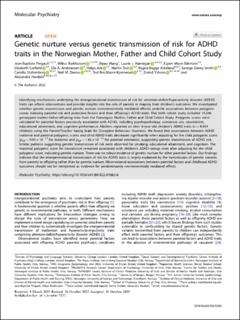| dc.contributor.author | Pingault, Jean-Baptiste | |
| dc.contributor.author | Barkhuizen, Wikus | |
| dc.contributor.author | Wang, Biyao | |
| dc.contributor.author | Hannigan, Laurie John | |
| dc.contributor.author | Eilertsen, Espen Moen | |
| dc.contributor.author | Corfield, Elizabeth Claire | |
| dc.contributor.author | Andreassen, Ole | |
| dc.contributor.author | Ask, Helga | |
| dc.contributor.author | Tesli, Martin Steen | |
| dc.contributor.author | Askeland, Ragna Bugge | |
| dc.contributor.author | Davey Smith, George | |
| dc.contributor.author | Stoltenberg, Camilla | |
| dc.contributor.author | Davies, Neil M. | |
| dc.contributor.author | Reichborn-Kjennerud, Ted | |
| dc.contributor.author | Ystrøm, Eivind | |
| dc.contributor.author | Havdahl, Alexandra | |
| dc.date.accessioned | 2022-12-08T09:48:25Z | |
| dc.date.available | 2022-12-08T09:48:25Z | |
| dc.date.created | 2022-11-25T20:35:49Z | |
| dc.date.issued | 2022 | |
| dc.identifier.issn | 1359-4184 | |
| dc.identifier.uri | https://hdl.handle.net/11250/3036692 | |
| dc.description.abstract | Identifying mechanisms underlying the intergenerational transmission of risk for attention-deficit/hyperactivity disorder (ADHD) traits can inform interventions and provide insights into the role of parents in shaping their children’s outcomes. We investigated whether genetic transmission and genetic nurture (environmentally mediated effects) underlie associations between polygenic scores indexing parental risk and protective factors and their offspring’s ADHD traits. This birth cohort study included 19,506 genotyped mother-father-offspring trios from the Norwegian Mother, Father and Child Cohort Study. Polygenic scores were calculated for parental factors previously associated with ADHD, including psychopathology, substance use, neuroticism, educational attainment, and cognitive performance. Mothers reported on their 8-year-old children’s ADHD traits (n = 9,454 children) using the Parent/Teacher Rating Scale for Disruptive Behaviour Disorders. We found that associations between ADHD maternal and paternal polygenic scores and child ADHD traits decreased significantly when adjusting for the child polygenic score (pΔβ = 9.95 × 10−17 for maternal and pΔβ = 1.48 × 10−14 for paternal estimates), suggesting genetic transmission of ADHD risk. Similar patterns suggesting genetic transmission of risk were observed for smoking, educational attainment, and cognition. The maternal polygenic score for neuroticism remained associated with children’s ADHD ratings even after adjusting for the child polygenic score, indicating genetic nurture. There was no robust evidence of genetic nurture for other parental factors. Our findings indicate that the intergenerational transmission of risk for ADHD traits is largely explained by the transmission of genetic variants from parents to offspring rather than by genetic nurture. Observational associations between parental factors and childhood ADHD outcomes should not be interpreted as evidence for predominantly environmentally mediated effects. | en_US |
| dc.language.iso | eng | en_US |
| dc.publisher | Springer Nature | en_US |
| dc.rights | Navngivelse 4.0 Internasjonal | * |
| dc.rights.uri | http://creativecommons.org/licenses/by/4.0/deed.no | * |
| dc.title | Genetic nurture versus genetic transmission of risk for ADHD traits in the Norwegian Mother, Father and Child Cohort Study | en_US |
| dc.title.alternative | Genetic nurture versus genetic transmission of risk for ADHD traits in the Norwegian Mother, Father and Child Cohort Study | en_US |
| dc.type | Peer reviewed | en_US |
| dc.type | Journal article | en_US |
| dc.description.version | publishedVersion | en_US |
| dc.source.journal | Molecular Psychiatry | en_US |
| dc.identifier.doi | https://doi.org/10.1038/s41380-022-01863-6 | |
| dc.identifier.cristin | 2081545 | |
| dc.relation.project | Norges forskningsråd: 274611 | en_US |
| dc.relation.project | Norges forskningsråd: 262177 | en_US |
| dc.relation.project | EU – Horisont Europa (EC/HEU): 101045526 | en_US |
| dc.relation.project | Helse Sør-Øst RHF: 2021045 | en_US |
| dc.relation.project | Norges forskningsråd: 288083 | en_US |
| cristin.ispublished | true | |
| cristin.fulltext | original | |
| cristin.qualitycode | 2 | |

